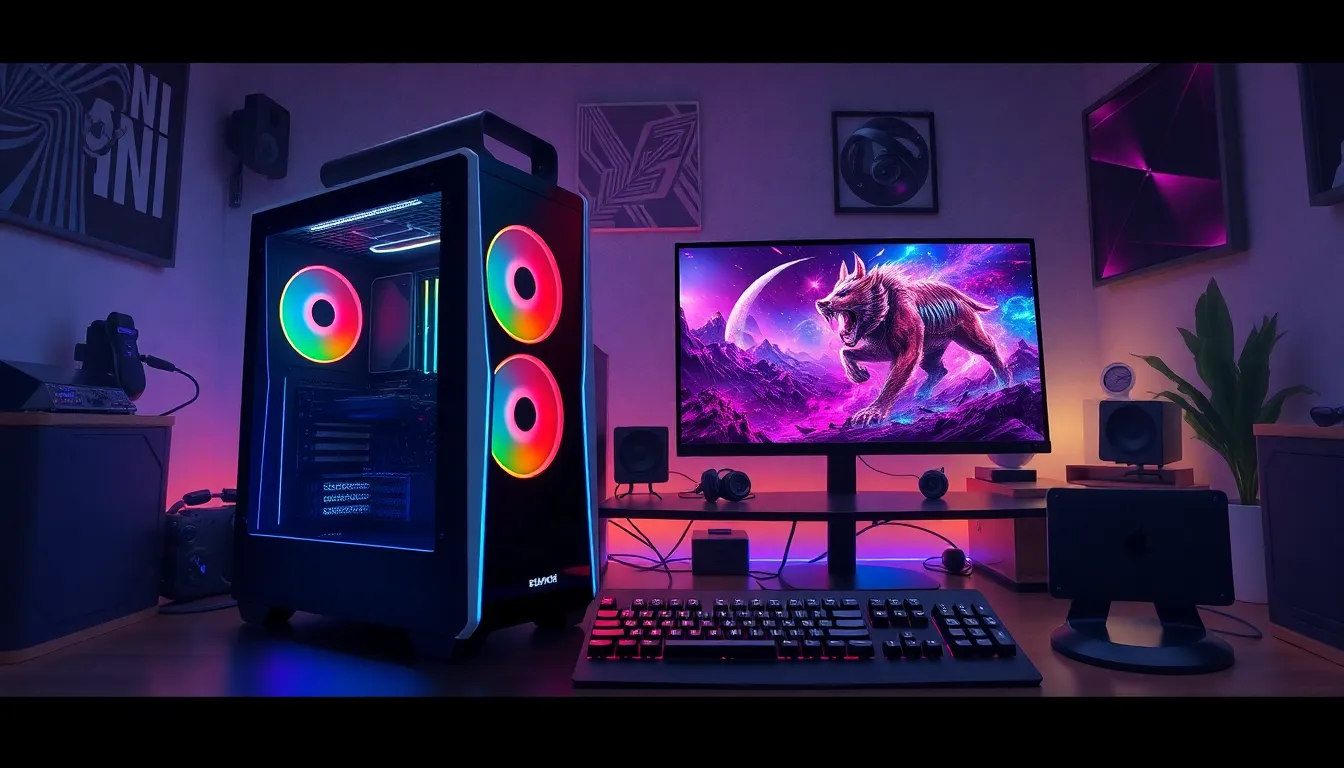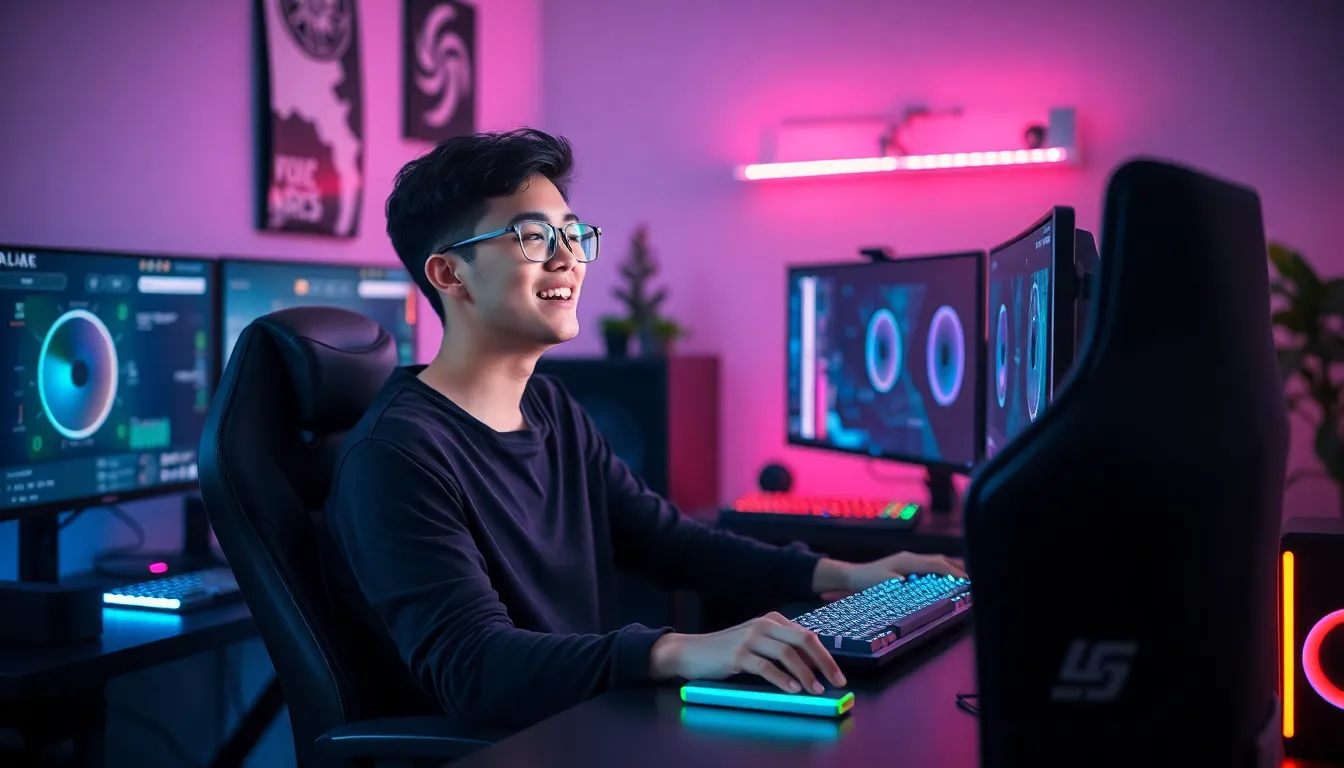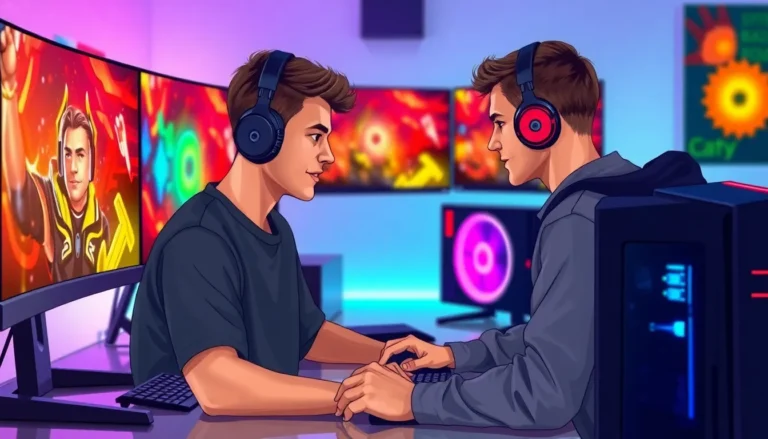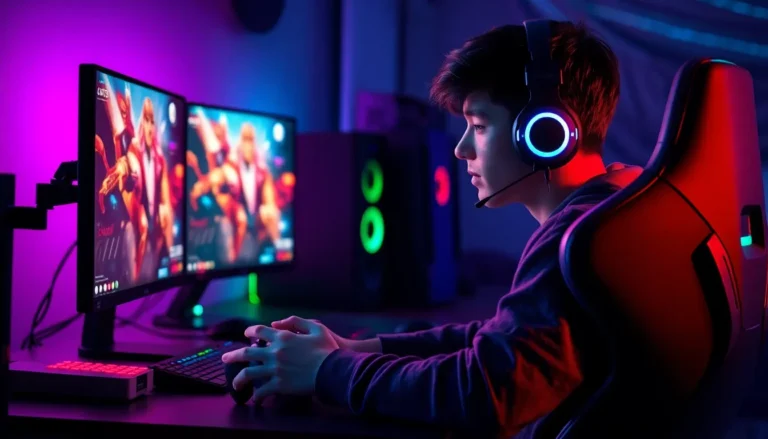In the world of gaming and streaming, having the right PC can make all the difference between a smooth victory and a cringe-worthy lag fest. Imagine your character heroically charging into battle while your computer decides it’s the perfect time for a coffee break. Not ideal, right? A powerful gaming and streaming PC is like having a trusty sidekick—always ready to deliver peak performance while you focus on leveling up your skills.
Gaming And Streaming PC
A gaming and streaming PC serves dual purposes, enabling users to enjoy high-performance gaming while simultaneously broadcasting gameplay. Such computers typically include powerful components to handle resource-intensive tasks. Key parts comprise a fast processor, ample RAM, and a capable graphics card.
Customizability is crucial for these systems, allowing users to optimize their configuration based on personal preferences and streaming needs. Gamers often seek at least 16 GB of RAM and, ideally, a graphics card from recent generations to ensure smooth performance. Many also consider dual-monitor setups for enhancing multitasking capabilities during streaming.
Streaming software requires additional resources, so solid-state drives (SSDs) can improve load times and system responsiveness. Encoders, whether hardware or software-based, play an essential role in delivering high-quality streams. Choosing the right CPU is vital, especially for handling gaming and streaming simultaneously. A multi-core processor, such as those from AMD Ryzen or Intel Core series, fulfills these needs effectively.
Cooling solutions are often necessary, as performance components generate heat. Liquid cooling systems or efficient air coolers help maintain optimal operating temperatures. Users also benefit from a robust power supply to ensure stability during intense gaming sessions.
Overall, a gaming and streaming PC significantly enhances the user experience by providing reliable performance and maintaining high-quality visuals.
Key Components of a Gaming and Streaming PC

Building a gaming and streaming PC requires careful selection of components to achieve high performance and reliability. Each part plays a critical role in ensuring an enjoyable gaming experience.
CPU Selection
The central processing unit (CPU) serves as the brain of the gaming and streaming PC. Prioritize multi-core processors, as they can handle multiple tasks simultaneously. Popular choices include AMD Ryzen 7 and Intel Core i7, known for their exceptional performance. A CPU with a higher clock speed enhances responsiveness during gaming sessions. Opt for models that support modern technologies, ensuring compatibility with current software and games.
GPU Considerations
Graphics processing units (GPUs) render images and videos, playing a crucial role in gaming and streaming performance. Select a GPU capable of meeting the demands of high-resolution gaming. Nvidia’s RTX series and AMD’s Radeon RX lineup provide excellent graphics rendering. A powerful GPU ensures smooth visuals, reducing lag and stuttering during gameplay. Consider models with dedicated video memory, which improves performance when streaming.
RAM Requirements
Random Access Memory (RAM) impacts the overall speed and efficiency of a gaming and streaming PC. A minimum of 16 GB is recommended to handle demanding applications and multitasking. Faster RAM with higher MHz ratings can enhance performance in resource-heavy games. Dual-channel configurations increase data transfer rates, further optimizing performance. Ensure compatibility with the motherboard to avoid potential issues.
Storage Solutions
Storage choices affect load times and system responsiveness. Solid-state drives (SSDs) significantly improve loading speeds compared to traditional hard drives. Aim for at least 500 GB of SSD space to house the operating system, games, and streaming software. Consider NVMe SSDs for faster read and write speeds; they provide optimal performance for gamers. Supplement with an additional hard drive for larger game libraries, ensuring efficient organization.
Build vs. Buy: Which Is Right for You?
Deciding between building or buying a gaming and streaming PC involves weighing multiple factors.
Pros and Cons of Building Your Own PC
Building a PC allows for complete customization, enabling selection of each component to meet specific gaming and streaming needs. Cost savings often emerge with this option; individuals can choose parts that fit their budget without paying for manufacturer markups. Flexibility in upgrades adds another advantage, providing the ability to replace or improve components over time. However, challenges exist. Technical knowledge is required during assembly; mistakes can lead to hardware damage. Warranty concerns may arise, as individual parts possess different guarantees, complicating potential repairs or replacements.
Benefits of Buying a Prebuilt Gaming PC
Purchasing a prebuilt gaming PC simplifies the process for users unfamiliar with hardware. Convenience ranks high since these systems come fully assembled, requiring minimal setup for immediate use. Reliability often accompanies brand-name systems, as they include warranties and customer support options. Performance is often tested and optimized, ensuring smooth gaming experiences from the start. On the downside, customization options are limited. Price may be higher due to manufacturing costs, reducing potential savings compared to building a PC.
Streaming Software and Setup
Optimizing a gaming and streaming PC entails selecting the right software and setup. The choices made here affect the quality of the streaming experience.
Popular Streaming Platforms
Twitch stands out as the leading streaming platform, widely used by gamers. YouTube Gaming offers expansive reach, allowing for video sharing alongside live streams. Facebook Gaming has gained traction due to its social media integration, drawing in more casual gamers. Each platform features unique monetization options, enabling streamers to earn income through subscriptions, donations, or ad revenue. Gamers should assess their audience and content type when selecting a platform for streaming.
Essential Streaming Tools and Software
OBS Studio serves as a popular choice for beginners and professionals, providing an open-source solution for live streaming. Streamlabs OBS integrates additional features, enhancing user experience with customizable alerts and themes. XSplit offers a user-friendly interface for those preferring a streamlined approach to streaming. Additionally, integrating tools like Discord improves communication with viewers and followers. He or she may include overlays and chatbot functionalities for a more interactive viewing experience. Quality encoding software ensures a smooth stream, maintaining video clarity and performance.
Performance Optimization Tips
Optimizing performance is crucial for gaming and streaming PCs. Implementing effective strategies enhances both gameplay and overall experience.
Enhancing Graphics Settings
Adjusting graphics settings can significantly improve visual performance. Start by finding the optimal resolution for your monitor. Reducing texture quality or shadow detail sometimes helps maintain frame rates. Disabling features like V-Sync and Anti-Aliasing often results in smoother gameplay. Utilizing game-specific graphics presets also streamlines adjustments, balancing visual fidelity and performance easily.
Reducing Lag and Latency
Minimizing lag and latency ensures a more enjoyable streaming experience. Prioritizing a wired Ethernet connection improves stability compared to Wi-Fi. Closing background applications frees up resources, reducing strain on the CPU and RAM. Using performance-optimized streaming software can help manage system resources effectively. Adjusting bitrate and resolution settings also plays a vital role in delivering clear, lag-free streams.
Conclusion
Investing in a powerful gaming and streaming PC is essential for anyone serious about their gaming experience. With the right components and setup, players can enjoy seamless gameplay and high-quality streams without the frustration of lag. Customization plays a key role in tailoring the system to individual needs, ensuring optimal performance.
Whether choosing to build or buy a PC, understanding personal preferences and technical skills will guide the decision-making process. Selecting the right software and optimizing settings further enhances the overall experience. By prioritizing performance and quality, gamers can elevate their skills and engage their audience effectively.




